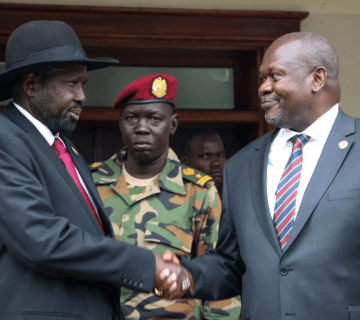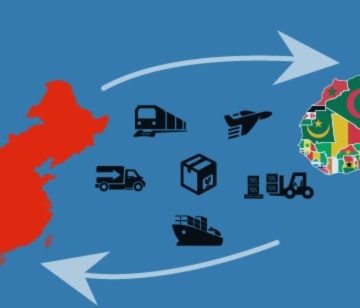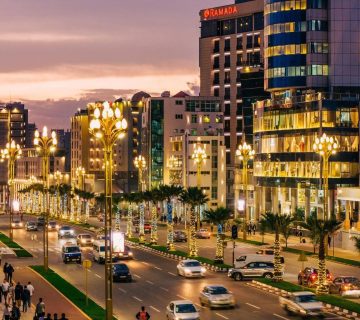The Democratic Republic of Congo (DRC) applied to join the East African Community (EAC) officially in June 2019 through a letter to the current Chairman of the bloc, Rwanda’s President, Paul Kagame. If this application were to be accepted, DRC would be the seventh member of the EAC. The potential entry of EAC’s third Francophone state will increase the population of the bloc by about 83.3 million and with it offer the largest market in the bloc, changing dynamics in the EAC. When assessing the eligibility of DRC, it is important to factor in the criteria set for membership to the bloc, and the impact that DRC could have on the stability and prosperity of EAC if its membership is not considered fully and managed well.
Existing Members
The EAC is currently made up of six member states, namely: Kenya, Uganda, Tanzania, Rwanda, Burundi, and the newest member, South Sudan, which joined in 2016. South Sudan has not been the only country to apply for membership in recent history. Somalia did so as well in 2012. Both South Sudan’s acceptance and Somalia’s rejection showcases the type of countries the EAC is looking to integrate with.
The Treaty for the Establishment of the East African Community (1999) clearly stipulates the set criteria for any state aspiring to become a member state in Article 3 (3). First, the applicant must adhere to the universally acceptable principles of good governance, democracy, the rule of law, and observance of human rights and justice. Secondly, the state should have the potential to strengthen the integration system of the bloc. Thirdly, it should be geographically proximate, as an interdependent relationship between the applying state and the current members are key for integration. Fourthly, the state should have established and maintained a market-driven economy. Additionally, its social and economic policies should be compatible with those of the Community. Lastly, as stated in Article 3 (4), other considerations may also be taken into account.
Somalia’s application was, from the beginning, likely to be rejected. At that time, insecurity was rife in Somalia; the country was referred to as a terror state, harboring al Shabab. Al Shabab had also been linked to al Qaida, making the security concern even greater. Secondly, the state had failed to curb piracy, which had evolved into an international problem. There were also concerns over women’s rights and general human freedoms and rights of the Somali people. These were coupled with suspicion from the EAC leaders who saw no reason for Somalia to wish to join the bloc, especially when Somalia are part of the Arab League, which was a stronger and much more lucrative alternative. At every front, Somalia could seemingly not meet the mark.
In comparison to Somalia, the case of South Sudan is not as clear. In 2016, the state had been granted independence from Sudan five years earlier (2011). This was on many accounts a new beginning for the Sudanese people. Taking into consideration its new status as a state, it was impossible to determine whether South Sudan met any criteria set out in Article 3 (3) of the EAC-establishing Treaty. Thus, other considerations were taken into account. These considerations were more than likely the opportunities that South Sudan potentially brought to the EAC. South Sudan was a new lucrative opportunity for the people and states of EAC. Filled with natural resources, it was a gem for the bloc. Unfortunately, South Sudan did not yield the results that were expected; the state has since fallen prey to political and economic instability.
DRC’s application may be accepted or rejected, either because of the set criteria, or, other considerations. Examining the criteria of the EAC, DRC fits the mould. First, DRC has close proximity (language, culture, and geography) with majority of the EAC member states neighboring Uganda, Rwanda, South Sudan, Tanzania, and Burundi. Secondly, the general elections held at the end of 2018, and the subsequent inauguration of President Felix Tshisekedi suggests a growth in the government – highlighting a positive trend for democracy and the rule of law. Thirdly, DRC has the potential to grow the integration level of the EAC, connecting the Community to the western part of the African continent. Fourthly, as reported by the World Bank in 2018, the poverty rate in the country has decreased, and although this has not removed DRC’s moniker of being one of the poorest states in the world, this is a positive change.
Impact of DRC on the EAC
If DRC’s application is accepted, it will become necessary to identify the positive and negative outcomes that may arise from DRC’s membership. On the one hand, DRC’s membership would be advantageous to the EAC. First, DRC would increase EAC’s sphere of influence. DRC’s approximately 83.3 million people would increase the Community’s population to about 275 million, from the current 193 million. This would highlight the regional Community’s newfound influence and strength among African regional bodies. Secondly, taking into consideration the turmoil the Community has been facing, including scandals involving the Community Secretariat in Arusha, this step to introduce the DRC into the fold would cause a shift in focus; bringing back the ideals that push this Community forward, and what its member states stand to gain. Thirdly, it cannot be ignored nor be understated that the amount of mineral resources DRC brings to the table are imponderable. The most natural resource-rich state joining the EAC would provide great investment opportunities for the current six members and their citizens. Fourthly, the population of DRC is a market ready to be tapped into. Once free movement and trade is facilitated, regional businesses will be much easier to establish. Fifth, this integration would keep the hope for the Pan-African dream of a united Africa alive.
On the other hand, DRC joining the EAC may not be such a good idea. DRC will only cause trouble for the Community. First, it is currently facing a problem in its political and social realms. The eastern part of DRC, in particular, is thought to have over 120 armed groups that the government has been unable to deal with. Similarly, EAC has shown to be unable to deal with this problem, taking into consideration that their previous attempts to bring sustainable peace and security in DRC have not been successful. DRC’s public health sector is also currently overwhelmed by Ebola and Measles outbreaks. The situation has progressively gotten worse, with cases of Ebola arising in Uganda, and a scare in Kenya, leading these neighboring states to closely monitor their shared borders with each other, and Uganda with DRC. Secondly, the current political climate in DRC has left doubt in the minds of many on whether President Felix Tshisekedi can truly deliver his promises to the people of DRC, and by extension of the EAC community. This is due to the fact that former President Joseph Kabila’s party still controls a large part of the government.
Additionally, DRC is already a member of the Southern African Development Community (SADC), meaning joining EAC, will divide its loyalty. This loyalty may be expressed in different ways. For example, the African states have a habit of not paying the required fees, especially when the states are in multiple blocs. Additionally, each bloc has its own set of standards and policies, when these policies are in contradiction, the result is disharmony.
Fourthly, although there is plenty of hope that DRC holds many opportunities for the people of EAC, it is important to remember that the Community has always been subject to the sentiments of its leaders. Historically, EAC disintegrated because, the presidents of Kenya, Uganda, and Tanzania respectively, Daniel arap Moi, Idi Amin, and Julius Nyerere, were not able to overcome their ideological and political differences. Currently, tensions between Tanzania and Kenya exists, this even being cited as the reason why Tanzania prefers to associate with SADC. Thus, these opportunities may not be as open as the EAC may think if the political relationship between the EAC head of states changes.
Currently, DRC does in fact fit into the set criteria of the EAC’s Establishing Treaty, and would be a very lucrative partner to have. However, EAC should be cautious in its admission of DRC, to avoid a repeat of the South Sudan situation whereby the country was accorded membership prematurely.
Raudhat Sayeeda Saddam is a Researcher at the HORN Institute.
Photo: Democratic Republic of Congo’s outgoing President Joseph Kabila (right) and his successor Felix Tshisekedi stand during Tshisekedi’s inauguration ceremony in Kinshasa, DRC, on January 24, 2019 (Photo Credit:



